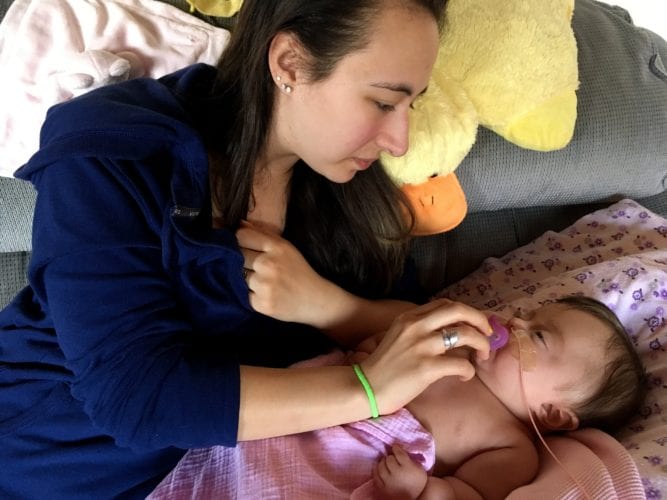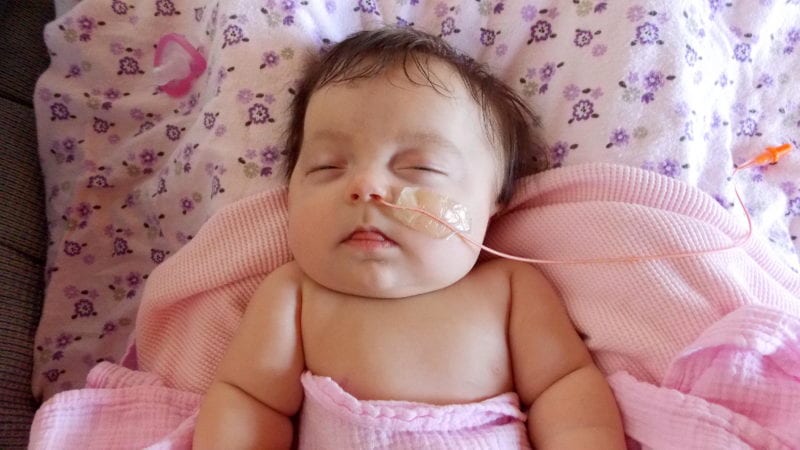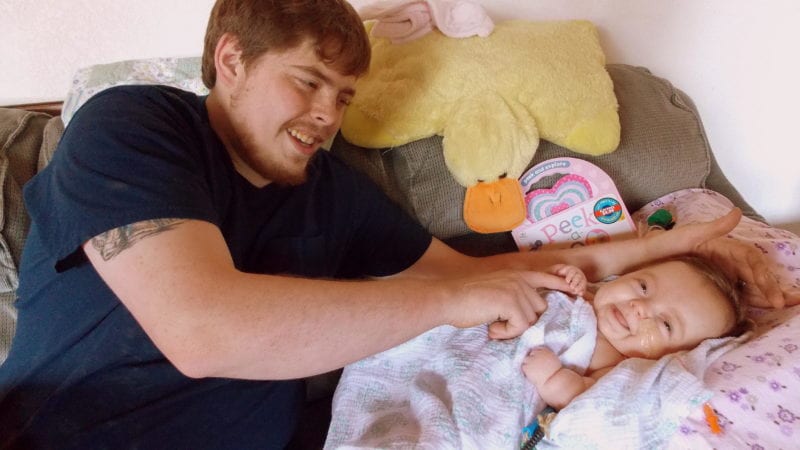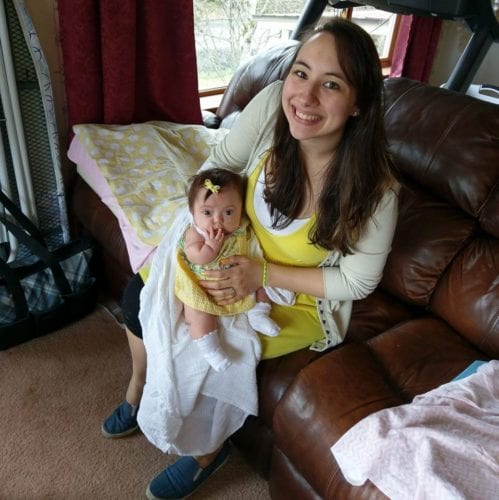
Rachel Hudson gazes at her 5-month-old daughter, Brynnleigh, who is enjoying one of her favorite things, her pacifier. Photo/Angela Denning
Brynnleigh Hudson is lying on the couch on her back cooing at her mother who is making faces at her a few feet away.
Although she’s a normal baby in many ways Brynnleigh is also very delicate. Just before she was born in January she was diagnosed with Osteogenesis Imperfecta. OI for short, also known as Brittle Bone Disease. It’s a genetic disorder causing fragile bones that break easily.
So her parents have to limit the way they touch her.
“This is a Farrell bag and this is how we burp her,” said, Rachel Hudson, her mother.
Rachel leans over and attaches a tiny long tube to another section of tube that’s already in Brynnleigh’s nose. It connects to a clear empty bag hanging on an IV stand.
“We’re not able to pat her on the back like you would a typical baby to get rid of a hiccup or to help get the air out of her belly,” Rachel said. “We have to hook her up to this Farrell bag and all of the air from her belly escapes into this tubing and goes all the way up to the top of this bag and at the end of the day we change it out and start a new one tomorrow.”
Brynnleigh also gets fed through a tube. Rachel pumps her breast milk every day for that.
It’s all to avoid moving Brynnleigh too much which could easily cause a fracture. She was born with 15 fractures in her body.

5-month-old Brynnleigh Hudson naps on the couch at her home. She has Osteogenesis Imperfecta, which causes fragile bones. Photo/Angela Denning
That’s not uncommon with OI. In mild cases there might be just a few fractures in a lifetime but in more severe cases, it can be hundreds. There are several types of OI with a wide spectrum of severity. Until she’s five or six years old, her parents won’t know exactly what they’re dealing with.
But, they’re used to not knowing.
It was an easy pregnancy with no morning sickness, but through prenatal testing at 20 weeks, doctors discovered that something was wrong. The length of Brynnleigh’s femurs was short, but the doctors couldn’t tell why at that early stage. There were dozens of possibilities.
Rachel saw a doctor every few days at Seattle Children’s Hospital, and a few weeks before the birth, they diagnosed her baby with OI.
“They could only tell us that she will be very fragile so we would have to be very careful,” Rachel said. “But that’s all that they could tell us because that’s all that they knew.”
Five and a half pound Brynnleigh was born by C section on January 6. There were 22 medical staff in the room at the time. Her parents couldn’t hold her for two weeks.
“Because we didn’t know the severity,” Rachel said. “And we didn’t want to risk giving her any new fractures.”
After a month in intensive care, she came home.
Now, everything that Brynnleigh touches must be soft. Only plush, lightweight toys are allowed. She spends most of her time on a memory foam pad.
Rachel and her husband, Lyman, are young, both just 22 years old. They’ve been together since they were teenagers. Lyman works at a grocery store and tries to take over baby care when he’s home to give Rachel a break. Babysitters are not an option.
Rachel’s cell phone rings.
“Sorry, I have to answer this,” she told me.
The local clinic is calling to remind Rachel of their next appointment tomorrow.
“In the chaos of everything mommies are allowed to forget,” Rachel said. “And I sure did forget.”
Brynnleigh has at least three medical appointments a week. But therapists visit the house now too.
Every few months they fly down to Seattle to receive treatment to make her bones stronger. Medicine is given through IVs eight hours a day for three days straight. It’s emotional for Rachel to remember Brynnleigh’s first treatment when she was just a week and a half old.
“It was excruciating trying to go through that,” Rachel said, choking up. “And seeing my newborn beautiful baby girl go through so much pain all over again just so she could get better. It was very difficult.”
Brynnleigh will receive the treatments ever few months for at least a year.
At home, Rachel and Lyman are getting more confident handling their baby. In addition to changing diapers – which they’ve had to master without lifting up her legs – there are tubes to change every day too. They’ve learned through many therapists, surgeons, and specialists. And now, the doctors look to them as the experts.
“When they have to take her temperature, they can’t just lift up her arm and put the thermometer underneath of her arm and in her armpit,” Rachel said. “So, I have to lift from the elbow up so that they can gently place it in there.”
The couple knows fractures will happen. At some point, she’ll start to roll over and that alone could trigger a break.
But no matter what the future holds, her parents are sure of one thing–Brynnleigh is a survivor.
Rachel Hudson welcomes people to reach out to her via her Facebook page.











